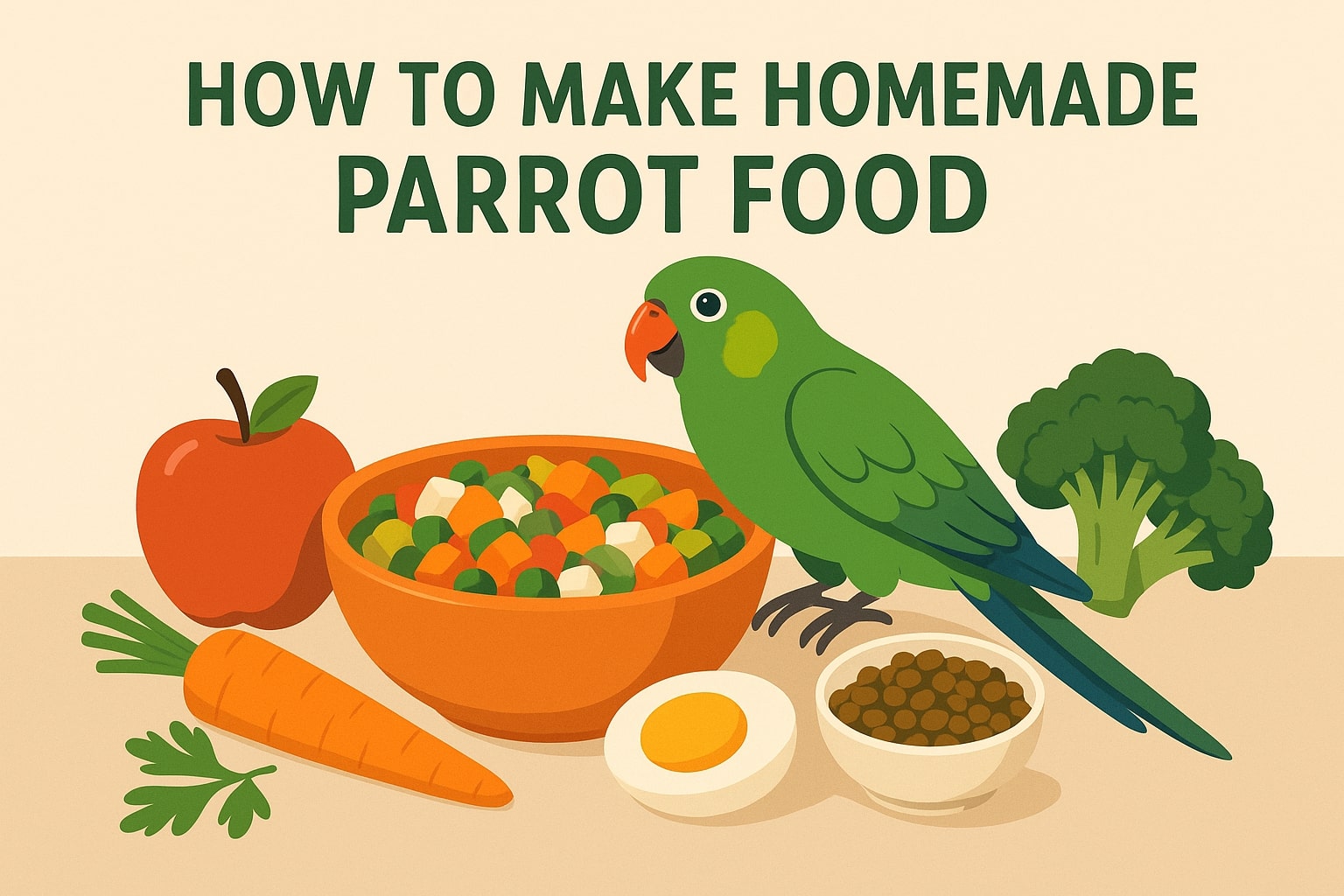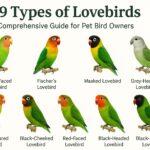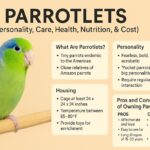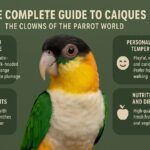Creating nutritious homemade meals for your parrot can significantly improve their health, vitality, and overall well-being while strengthening the bond between you and your feathered companion. Proper nutrition plays a critical role in supporting your parrot’s immune system, maintaining vibrant plumage, and promoting longevity.
Unlike generic commercial diets, homemade parrot food allows you to control ingredients, ensure freshness, and cater to your bird’s specific dietary requirements. This comprehensive guide provides five tested recipes using safe, nutritious ingredients that will keep your parrot healthy and satisfied.
Understanding Your Parrot’s Nutritional Requirements
Parrots have unique dietary needs that differ significantly from other pets, requiring a carefully balanced mix of nutrients to thrive. These intelligent birds are omnivores, meaning they need variety in their diet to obtain essential vitamins, minerals, and amino acids necessary for optimal health. The nutritional requirements can vary considerably depending on species, age, and current health status. Larger species such as macaws typically require higher fat content compared to smaller parrots like budgerigars, while young, growing birds need increased protein to support proper development.
The foundation of proper parrot nutrition rests on four main nutrient groups that must be represented in their daily meals. These include proteins for growth and tissue repair, carbohydrates for energy, healthy fats for skin and feather condition, and essential vitamins and minerals for metabolic processes.
Professional avian veterinarians recommend that companion parrots receive approximately 70% high-quality pellets and 30% fresh foods including vegetables, fruits, sprouts, and leafy greens. This ratio ensures complete nutrition while preventing selective eating habits that can lead to deficiencies.
Understanding these requirements becomes crucial when preparing homemade meals. Protein sources should include cooked legumes, scrambled or hard-boiled eggs, and small amounts of cooked chicken. Complex carbohydrates like cooked pasta and rice provide sustained energy. Fresh vegetables and fruits supply vital vitamins and antioxidants that support immune function and cellular health.
Essential Ingredients for Homemade Parrot Food
Building a pantry of safe, nutritious ingredients forms the foundation for successful homemade parrot food preparation. Protein sources represent perhaps the most important category, with cooked legumes leading the list of recommended options. Lima beans, lentils, pinto beans, and kidney beans provide excellent protein content along with fiber and essential vitamins. These legumes should always be thoroughly cooked before serving to ensure digestibility and eliminate any harmful compounds.
Eggs serve as another outstanding protein source, offering complete amino acid profiles essential for your parrot’s health. Both egg whites and yolks can be scrambled or hard-boiled, though owners should note that eggs contain high cholesterol levels and should be offered in moderation. Cooked chicken provides lean protein when prepared fresh and served immediately, never reheated as this can create dangerous bacterial conditions.
Fresh vegetables form the cornerstone of nutritious homemade parrot meals. Leafy greens like kale, spinach, and collard greens supply calcium, iron, and folate. Root vegetables including carrots, sweet potatoes, and beets provide beta-carotene and natural sugars.
Cruciferous vegetables such as broccoli and cauliflower offer antioxidants and fiber. Always wash vegetables thoroughly and chop them into appropriate sizes for your parrot’s species.
Whole grains contribute complex carbohydrates and B vitamins to your parrot’s diet. Brown rice, quinoa, and whole wheat pasta can be cooked and included in homemade mixtures. These ingredients provide sustained energy and help maintain stable blood sugar levels throughout the day.
Recipe 1: Protein-Rich Legume Medley
This nutrient-dense recipe focuses on providing high-quality protein through a variety of cooked legumes, perfect for supporting growth and maintaining muscle mass in active parrots.
Ingredients:
- 1 cup cooked lentils
- 1/2 cup cooked chickpeas
- 1/2 cup cooked black beans
- 1/4 cup cooked quinoa
- 1 hard-boiled egg, chopped
- 1/4 cup diced carrots
- 1/4 cup chopped broccoli florets
Preparation:
Cook all legumes separately until tender, ensuring they are completely soft. Drain and rinse thoroughly to remove any residual cooking liquid. Hard-boil the egg and chop into small pieces appropriate for your parrot’s size.
Steam carrots and broccoli until slightly tender but still crisp. Combine all ingredients in a large mixing bowl and stir gently to distribute evenly. This recipe provides approximately 6-8 servings for medium-sized parrots and can be stored in the refrigerator for up to three days.
Recipe 2: Vegetable and Grain Power Bowl
This colorful recipe emphasizes fresh vegetables and whole grains, providing essential vitamins, minerals, and complex carbohydrates for sustained energy.
Ingredients:
- 1 cup cooked brown rice
- 1/2 cup cooked whole wheat pasta
- 1/4 cup diced sweet potato
- 1/4 cup chopped kale
- 1/4 cup diced bell peppers (red and yellow)
- 2 tablespoons chopped fresh parsley
- 1/4 cup cooked corn kernels
Preparation:
Cook brown rice and pasta according to package directions, ensuring grains are tender. Steam sweet potato until soft and dice into small pieces. Wash kale thoroughly and chop finely, removing tough stems.
Dice bell peppers into small, manageable pieces. Combine all ingredients while still warm to help flavors mingle. The natural sweetness from sweet potato and corn makes this recipe particularly appealing to picky eaters.
Recipe 3: Tropical Fruit and Vegetable Mix
This recipe incorporates safe fruits with vegetables, providing natural sugars, antioxidants, and a variety of textures that most parrots find irresistible.
Ingredients:
- 1/2 cup diced apple (seeds removed)
- 1/4 cup chopped mango
- 1/4 cup diced papaya
- 1/4 cup shredded carrots
- 1/4 cup chopped spinach
- 2 tablespoons cooked lima beans
- 1 tablespoon unsalted, chopped almonds
Preparation:
Thoroughly wash and prepare all fruits, removing any seeds or pits which can be toxic to parrots. Dice fruits into appropriate sizes for your bird. Shred carrots finely and chop spinach after washing. Add cooked lima beans for protein content.
Sprinkle chopped almonds sparingly, as nuts should represent only a small portion of the diet due to high fat content. This mixture provides natural sugars for quick energy while maintaining nutritional balance.
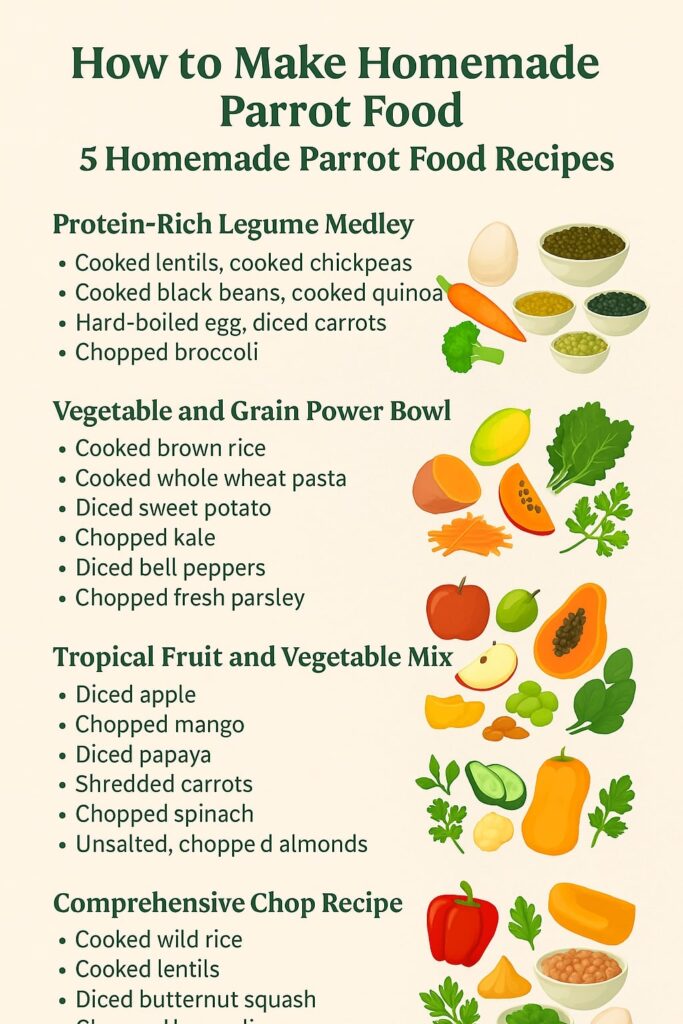
Recipe 4: Sprouted Seed and Green Combination
Sprouted seeds offer enhanced nutritional value compared to dry seeds, providing increased vitamins and improved digestibility when properly prepared.
Ingredients:
- 1/2 cup mixed sprouted seeds (mung beans, alfalfa)
- 1/4 cup chopped cucumber
- 1/4 cup diced zucchini
- 2 tablespoons chopped cilantro
- 1/4 cup cooked pinto beans
- 1 scrambled egg, cooled
- 1 tablespoon chopped fresh mint
Preparation:
Prepare sprouts using proper sprouting techniques, ensuring they are fresh and free from mold contamination. Wash and dice cucumber and zucchini into small pieces. Chop fresh herbs finely to release their aromatic properties. Scramble egg without oil or seasoning and allow to cool completely. Combine all ingredients gently, taking care not to break delicate sprouts. This recipe should be consumed within 24 hours due to the perishable nature of fresh sprouts.
Recipe 5: Comprehensive Chop Recipe
This versatile recipe, inspired by the popular “chop” method mentioned in avian nutrition circles, combines multiple food groups into one complete meal that can be prepared in large batches and frozen for convenience.
Ingredients:
- 1 cup cooked wild rice
- 1/2 cup cooked lentils
- 1/4 cup diced butternut squash
- 1/4 cup chopped broccoli
- 1/4 cup diced red bell pepper
- 2 tablespoons chopped fresh basil
- 1/4 cup cooked garbanzo beans
- 1 hard-boiled egg, chopped
Preparation:
Cook wild rice until tender and fluffy. Prepare lentils until soft and drain thoroughly. Steam butternut squash until easily pierced with a fork. Blanch broccoli briefly to maintain vibrant color and crisp texture.
Dice bell pepper finely and chop fresh basil. Combine all ingredients in a large bowl, mixing thoroughly to ensure even distribution. This recipe can be divided into individual portions and frozen in small containers or freezer bags for up to three months.
Safety Guidelines and Foods to Avoid
While preparing homemade parrot food, understanding which ingredients pose dangers is absolutely critical for your bird’s safety. Several common household foods can be toxic or even fatal to parrots and must be strictly avoided.
Avocado tops the list of dangerous foods, containing persin which can cause severe respiratory distress and cardiac problems in birds. Chocolate contains theobromine and caffeine, both toxic compounds that can cause seizures and death.
Other foods requiring complete avoidance include alcohol, apple seeds, caffeinated beverages, fruit pits, mushrooms, onions, raw dairy products, and rhubarb leaves. Additionally, avoid foods high in salt, fat, and sugar, as well as those containing artificial colors or preservatives. Nuts should be offered sparingly due to their high calorie content, and salty nuts or snacks should never be given.
When preparing protein sources, never serve raw or undercooked eggs, and avoid red meat or pork which contains excessive phosphorus and fat. Shellfish should also be avoided due to potential toxin contamination, though swimming fish like salmon or tuna can be offered occasionally.
Storage and Preparation Tips
Proper storage and handling techniques ensure your homemade parrot food remains fresh, nutritious, and safe for consumption. Fresh batches should be stored in airtight containers in the refrigerator and used within three to four days.
For longer storage, portion meals into individual servings and freeze in small containers or freezer bags for up to three months.
When preparing large batches, always use clean utensils and prepare ingredients in sanitary conditions. Allow cooked ingredients to cool completely before combining with fresh components to prevent spoilage. Label containers with preparation dates to track freshness and rotate stock appropriately.
Thaw frozen portions in the refrigerator overnight rather than at room temperature to prevent bacterial growth. Warm food slightly before serving, as many parrots prefer their meals at room temperature or slightly warm. Never microwave frozen portions, as this can create hot spots that might burn your bird’s mouth.
Conclusion
Creating homemade parrot food represents one of the most meaningful ways to care for your feathered companion while ensuring they receive optimal nutrition. These five recipes provide a foundation for healthy meal preparation, incorporating the essential nutrients your parrot needs to thrive.
Remember that treats should never exceed 3-5% of daily food intake, and homemade meals should complement rather than completely replace high-quality commercial pellets. Regular weight monitoring helps track your parrot’s response to dietary changes, and consulting with an avian veterinarian ensures your homemade feeding program meets your specific bird’s needs.
With careful attention to ingredient selection, proper preparation techniques, and safe storage practices, you can provide your parrot with delicious, nutritious meals that support their health and happiness for years to come.
- Parrotlets (Personality, Care, Health, Nutrition, & Cost) - June 20, 2025
- Caique (Personality, Care, Health, & Nutrition) - June 20, 2025
- The Complete Guide to Golden Retrievers - June 9, 2025
